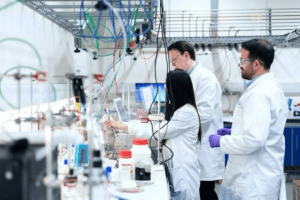Applied Physics
The area of physics called “Applied Physics” concerns using scientific theories and principles in real-world applications. It involves designing and developing new technologies and products used in various industries. This includes engineering, medicine, telecommunications, and manufacturing, using mathematical models and physical principles.
Where is Applied Physics used?
The following are some instances of applied physics in use:
1. Materials science:
the study of a material’s characteristics and potential applications
2. Optics:
the study of light, its behaviour, and how it can be used in areas like laser technology, imaging, and telecommunications.
3. Nanotechnology
It has applications in electronics, medicine and energy and is the study of materials and devices at the nanoscale.
4. Biophysics:
the study of biological systems, like the structure and operation of proteins and DNA, using methods and principles from physics.
5. Energy:
the investigation of energy generation, transmission, and storage. It also includes creating new technologies to increase energy efficiency and lessen environmental impact.
Degrees in Applied Physics
1. Bachelor’s Degree in Applied Physics:
This four-year undergraduate program offers a solid physics, mathematics, and engineering foundation.
2. Master’s in Applied Physics:
This graduate program lasts two years and offers advanced knowledge and abilities in applied physics. Coursework in biophysics, nanotechnology, solid-state physics, and optics is included.
3. M.Phil. in Applied Physics:
is a research-oriented program for two years after a Master’s degree in Applied Physics or a related field.
4. PhD in Applied Physics:
the typical completion time is four to five years. It entails carrying out original research in a particular branch of applied physics and contributing to the development of science.
Jobs in Applied Physics
Following are some career options for people with an education in applied physics may pursue:
1. Research scientists:
Universities, governments, and research institutions employ Research Scientists. To advance science and create new technologies, they carry out research in fields like materials science, optics, energy, and biophysics.
2. Engineers
Sectors such as manufacturing, energy, aerospace, and telecommunications employ applied physics engineers. They design and create new products and technologies used in these industries using their understanding of physics.
3. Technical Specialists:
The biotechnology, pharmaceuticals, and electronics sectors employ Technical Specialists They offer technical assistance and know-how in product design, testing, and quality control.
4. Data Scientist:
Applied physics-trained data scientists apply their data analysis and modelling expertise to tackle challenges across various industries. This includes energy, healthcare, and finance.
5. Teacher or Professor:
You can pursue a career in academia as a teacher or professor, conducting research and teaching in various areas of physics.
Why a degree in Applied Physics?
Applied physics provides a solid foundation in physics concepts and practical experience with versatile theoretical and experimental methods.
One can become a research scientist, engineer, technical specialist, data scientist, teacher, or professor after a degree in applied physics.
An Applied Physics degree leads to diverse career opportunities in telecommunications, electronics, energy, and healthcare industries.



